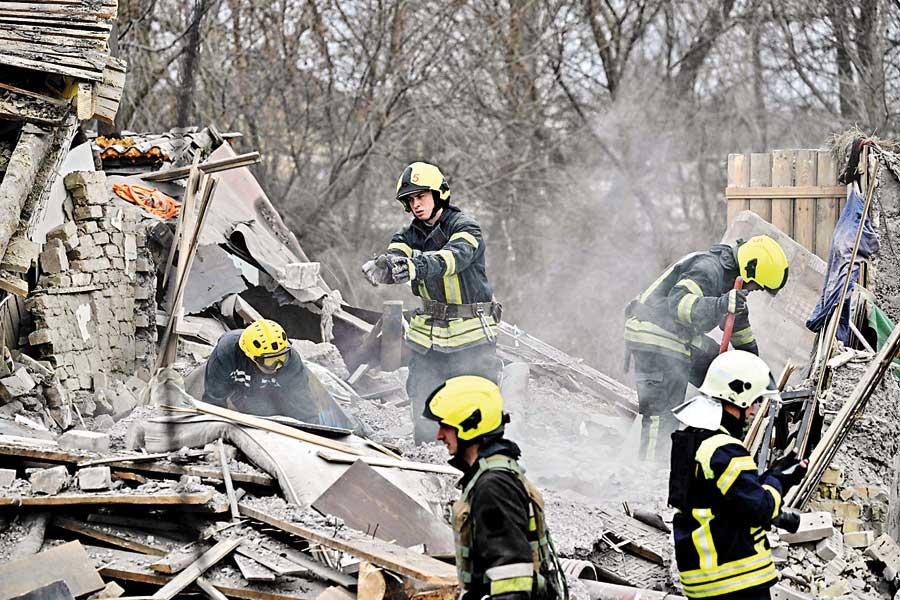30 Dec 2022 - {{hitsCtrl.values.hits}}

A man receives a Covid-19 vaccine in China’s eastern Shandong province yesterday. AFP
If there is a one-liner to describe the withdrawing year, it may go like this: With Covid, it entered and with Covid, it departed. 
As we prepare to welcome 2023, beware that the pandemic is far from over. The complacency with which people take part in yearend parties is like an open-arm welcome for a new variant of Covid-19. This is more so, in the wake of Monday’s decision by China to relax border restrictions and do away with some of its tough Covid regulations and its zero-Covid policy.
Ironically, when China opens its door, other countries close theirs. As the Chinese rush to book air tickets to travel abroad, other countries fear the possibility of new Covid variants entering from China which, despite the relaxation of the rules, is still battling the world’s biggest surge in infections this year.
Although United States President Joe Biden in September declared “the pandemic is over”, the bottom line is there is mounting concern over a new Covid wave.
There is no silver lining in the Covid cloud or a miracle medicine, except blind faith in the vaccines already in circulation. The vaccines approved by the World Health Organisation have contributed to a decrease in the cases and the number of deaths and enabled many countries to return to near normalcy. But the efficacy of these vaccines, even the boosters, is short-lived. As we bid a GROBR farewell to 2022, we see no major medical breakthrough to end the pandemic which has so far claimed 6.68 million lives and infected 659 million people worldwide.
Let’s put Covid aside and see how the world evolved or revolved around the political axis in the passing year. If there is one phrase to describe the political developments of the year, it is “self-destruction”.
When the year began, the declining Covid cases stirred hope for worldwide economic revival. But this was not to be. Instead, world leaders became over-selfish and embarked on the path to self-destruction, instead of acting in the interest of the entire humanity. But altruism in politics is like pork in a Muslim meal.
Shattering the hopes the suffering billions around the world had in some sort of economic revival that could lift them up from Covid-induced-lockdown poverty, the United States-led West and Russia started a war over Ukraine in February this year.
The conflict was not inevitable. It could have been averted. But Ukraine’s President Volodymyr Zelenskyy fell into the trap set by his Western allies. Rubbishing Russia’s security concerns, he played according to the West’s script and courted NATO to obtain membership.
The ten-month-old war has brought the world to the edge of a nuclear holocaust. Fears of tactical nuclear weapons being used are increasing with both sides upping the ante. As the war makes the plight of the suffering billions more acute with each passing day, amid food and fuel prices reaching astronomical heights, in corruption-ridden developing countries like Sri Lanka, the poor and middle-income people are being hit from all sides. They are like scrap metal that goes into a crusher.
Although rich countries are well equipped to cushion the economic shocks of the war, in poor countries, people are pushed into a socioeconomic hellhole.
The 2022 world events add credence to the claim that a destructive ideology is in operation. It starves the poor to death for the rich to enjoy the world’s depleting resources. Called the population holocaust or poverty holocaust, this ideology is more destructive than the nuclear holocaust that could happen if the Ukraine war escalates.
This anti-humanistic ideological current is running through right-wing extremism, racism, xenophobia, terrorism and even through the failure of the rich and powerful nations to reach a comprehensive accord to combat climate change.
This destructive ideology is also evident in Israel where a new government took the reins yesterday. Headed by hardliner Benjamin Netanyahu, the government includes ultra-right extremist leaders who call for the annihilation of the Arab and Palestinian populations in Israel and the occupied territories. With 2022 being described as the worst year for the Palestinian people in the past two decades, 2023 is likely to become worse than the worst, unless the US, Israel’s protector, prevails upon the Netanyahu government and urges it to exercise restraint.
The year also saw 100 million people becoming refugees through wars across the world.
For yet another year, peace eluded the people of poverty-stricken and war-ravaged Yemen, with the world powers adopting a ‘let them die’ attitude. The Syrian conflict, though still simmering, made no major headlines in 2022. Also less spoken about was Iraq’s multiple crises.
But neighbouring Iran kept the Western media busy. Initially, it was about the six-party talks on Teheran’s nuclear programme, but in the past three months or so, it was about street protests that erupted after the death of a woman arrested for allegedly violating the country’s hijab laws.
The Iranian government says the protests that have claimed nearly 300 lives are engineered by the West to instal a pro-West puppet regime in Iran.
Britain also made international headlines this year not only for the death of the United Kingdom’s longest-reigning monarch, Queen Elizabeth II, but also for churning out three prime ministers in one year.
While the West and Russia have locked horns in a war that only hastens the deaths of the world’s poor, China is making steady progress in world affairs at its own pace. At the 20th Communist Party Congress in Beijing in October, Communist Party General Secretary Xi Jinping secured an unprecedented third term as China’s top leader. Soon after he was well ensconced in the top position, he unleashed diplomatic campaigns in several directions to assert China’s power.
Early this month, he was in Saudi Arabia for a series of meetings with Arab leaders and to send a subtle message to the US that the time had come for China to play a dominant role in Middle Eastern affairs.
Unlike Russia, China is not rushing to meet the West in a military confrontation. It has mastered assertive diplomacy shaped by a measured display of military muscle and willingness to talk. This is evident in the manner in which it handles the dispute over Taiwan.
So if there is one winner in 2022, it is once again China, which is likely to end the US’s lengthy run as the world’s largest economy and military power in a decade or so.

Rescuers clear debris of homes destroyed by a Russian missile attack in the outskirts of Kyiv yesterday. AFP
09 Jan 2025 2 hours ago
09 Jan 2025 4 hours ago
09 Jan 2025 6 hours ago
09 Jan 2025 7 hours ago
09 Jan 2025 8 hours ago